Forbidden Broadway: Behind the Mylar Curtain (42 page)
Read Forbidden Broadway: Behind the Mylar Curtain Online
Authors: Gerard Alessandrini,Michael Portantiere

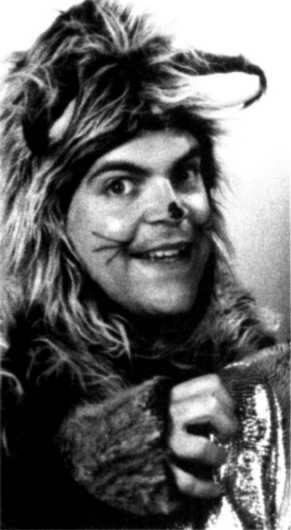
Brad Oscar.
I remember that we were in previews for the '93 edition at Theatre Eastor "Theatre Beast," as it was affectionately known. Numbers came and
went as they were tried and refined.
For two performances, the show included a real treasure of a number: Annie and Daddy Warbucks want to take in a Broadway show, but
the ABCs are full of shows dealing with homosexuality and the AIDS
epidemic, Angels in America being the leader of the pack. Daddy must
explain to Annie why he can't take her to see these shows, and he does
so in a song sung to the tune of "NYC," called... "HIV." Then I came out
as Roy Cohn and chewed Annie out over something I can't recall.
Let's just say that this was our "Springtime for Hitler" moment. The
audience on the first night-which happened to include a group from
the New York City Gay Men's Chorus-just sat there, stunned that such
a thing would ever be sung about. And the second night wasn't much
better. So out the number went, but I still think it was rather brilliant in
its reflection of what was going on in the American theater at the time.
It was a brave move on Gerard's part.
In the same edition, I had to play Gregory Hines as Jelly Roll Morton
in a tight Afro wig. Need I tell you that number also didn't last through previews?
I remember the evening when, during our Spider Woman number, Susanne
Blakeslee somehow got cut and started to bleed all over her white Chita outfit. The
audience thought it was part of the act. And I'll always remember the sound of Carol
Burnett laughing from the audience when we performed at the Tiffany Theater in L.A.
during the summer of '94. That distinctive laugh was the highest compliment one
could receive.
One of the joys of writing Broadway parodies is that I have to see every show, but one of
the burdens of writing Broadway parodies is that I have to see every show. Mind you, I'm
rarely given comp tickets; I almost always have to pay my way in. So when I don't get my
money's worth, I'm really not a happy camper. Perhaps this gives me an outlook that's
more or less in line with that of the average theatregoer. It also helps if I bring
along someone who's not a showbiz insider, so I can get another opinion.
While visiting my parents in Boston
in late 1989, 1 thought it might be fun to
bring my mother to see the out-of-town
tryout of Grand Hotel. We had lovely box
seats; that was a good thing, because
my mother's theatre etiquette was never
very good, and she'd often make comments during a show. As you might have
heard, Grand Hotel had a rough time in
Boston. My mother was rather confused
by the minimalist staging and by the
sets, which consisted largely of chairs
and not much else. When one of the
actors said, "People come, people go,
nothing ever happens at the Grand Hotel," she retorted: "People come, people
go, people move chairs." I immediately
put that line into Forbidden Broadway. I
mean, if you can't steal from your mother, who can you steal from?
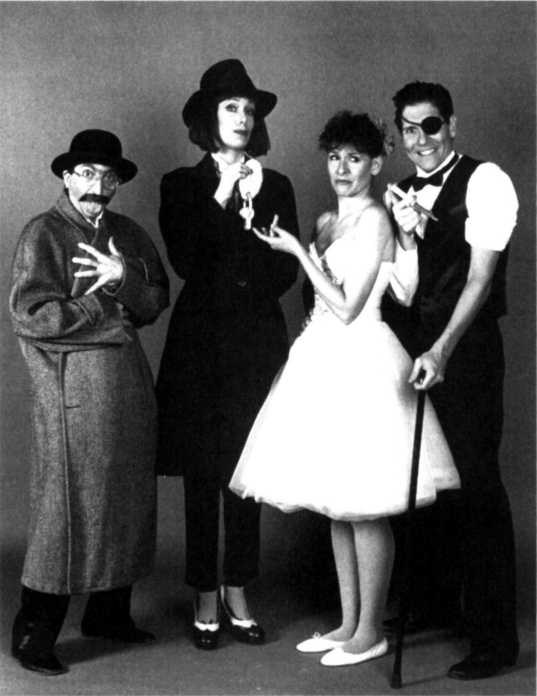
Jeff Lyons, Susanne Blakeslee, Marilyn Pasekoff, and Herndon
Lackey in "Grim Hotel."
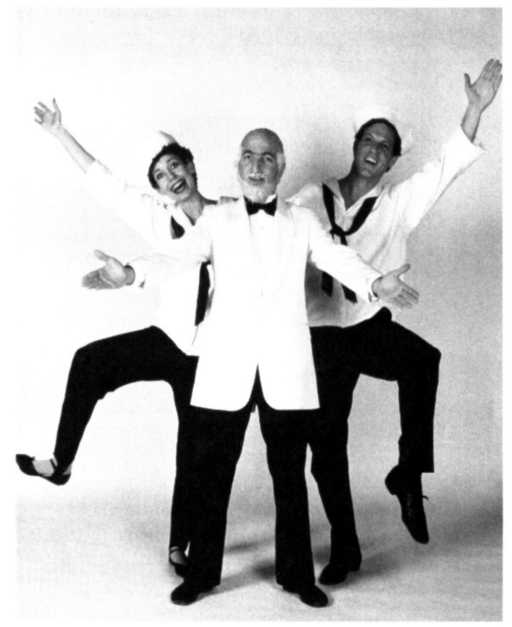
Susanne Blakeslee, Jeff Lyons (as Jerome Robbins), and
Bob Rogerson sing "Jerome, Jerome, a Helluva Guy!"
While our show was playing at Theatre
East, revivals were really taking hold on
Broadway. Guys and Dolls was a major revival of the early '90s, so big a hit that it was
almost like a new show. There was the "Teeny
Todd" take on Sweeney Todd at Circle in the
Square, and there was Gypsy with Tyne Daly.
Jerome Robbins' Broadway was a wonderful
show, but it smacked of an era that had gone
by. In the air, there was a general feeling of
"We don't know how to do great new shows,
so we'll just revive and revue the old ones."
Speaking of days gone by, Little Orphan
Annie was struggling to make a comeback:
Annie 2 tried to come in from out of town,
but failed in its first incarnation. A new version of the sequel came in later as Annie Warbucks, but it played Off-Broadway, not on. So
it seemed appropriate that we now had a new
and more durable spoof of Annie:
There were also some great revivals of straight plays at that time, such as Orpheus
Descending with Vanessa Redgrave. And there were some excellent London imports
of straight plays, like Lettice and Lovage with Maggie Smith.
City of Angels was a classy, wonderfully clever addition to Broadway. Of course, it
was itself a spoof or takeoff on films noir from the '40s, and I have since learned that it's nearly impossible to spoof a spoof. Also, City of Angels was very well written by
comedic genius Larry Gelbart (book), the great wordsmith David Zippel (lyrics), and
one of Broadway's all-time best composers, Cy Coleman. Being so well done, it was
impossible to top. (I had the same problem later with The Producers.) But City was one
of the few new book musicals of the '90s, so we had to take a crack at it. Our version
did get a few laughs, mainly because of the clever costumes, which were half black
and white, half color-an exaggeration of the premise of the real show.
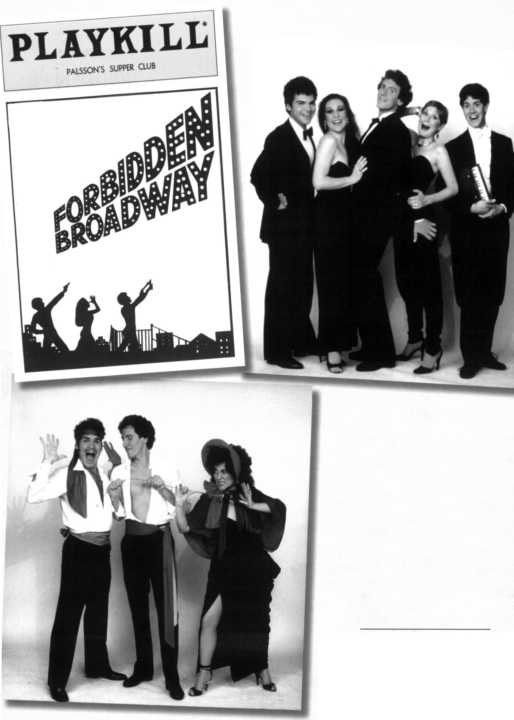
Top: The original cast of Forbidden
Broadway: Gerard Alessandrini, Nora Mae
Lyng, Bill Carmichael, Chloe Webb, and
Fred Barton. Bottom: Gerard, Bill, and Nora
parody The Pirates of Penzance.
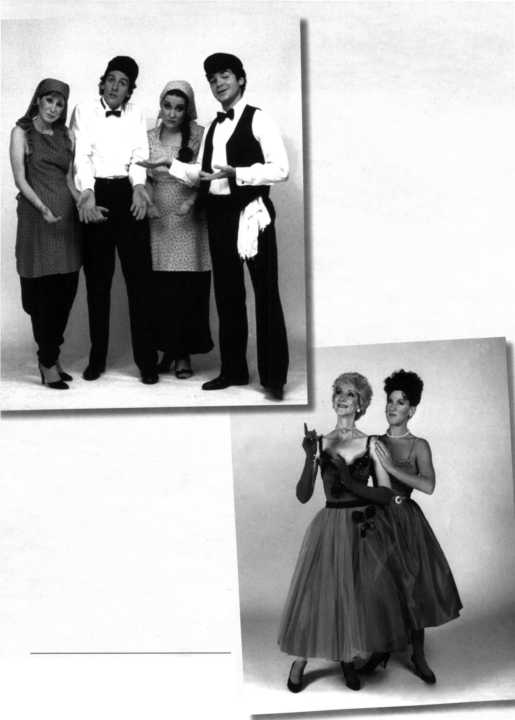
Top: Chloe, Bill, Nora, and Gerard spoof Fiddler on the
Roof. Bottom: Roxie Lucas as Mary Martin and Toni
DiBuono as Ethel Merman.
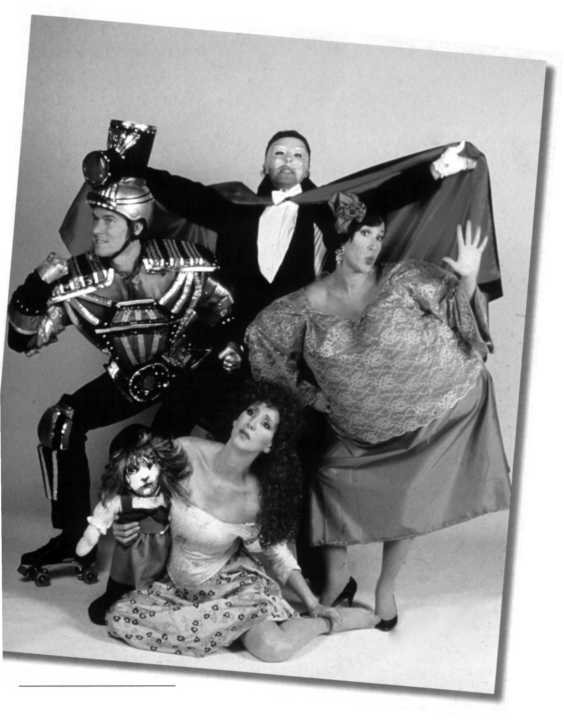
David B. McDonald, Michael McGrath,
Toni DiBuono, and Roxie Lucas:
Forbidden Broadway '88.
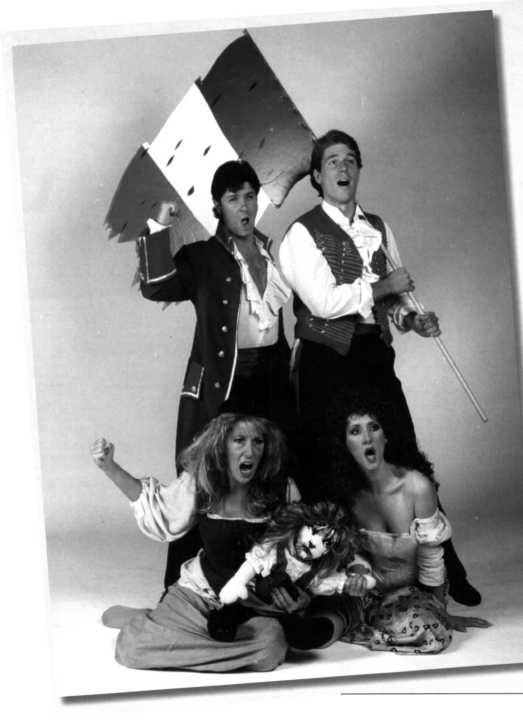
The British Invasion: Michael McGrath, David B.
McDonald, Toni DiBuono, and Roxie Lucas slam Les Miz.
